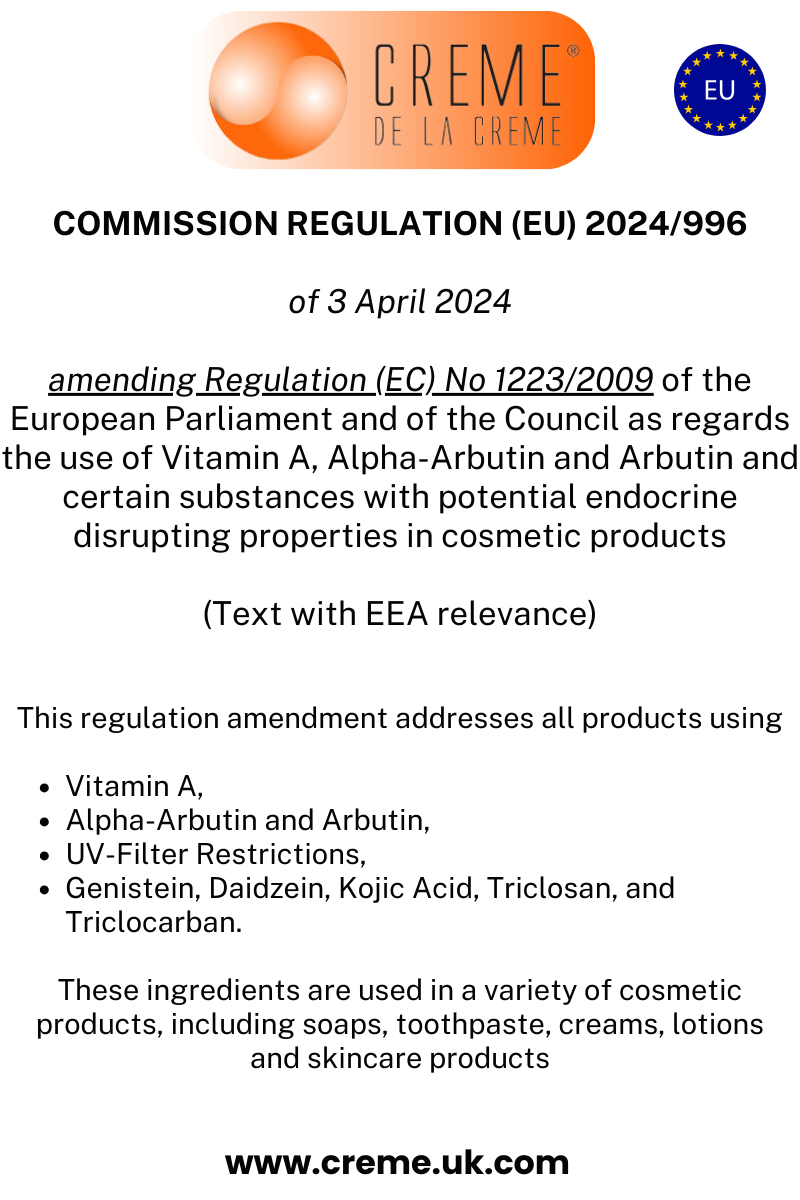The European Union has issued a crucial update, amending Regulation (EC) No 1223/2009 of the European Parliament and of the Council. This update specifically focuses on the use of Vitamin A, Alpha-Arbutin, and Arbutin, as well as certain substances with potential endocrine-disrupting properties in cosmetic products. This is a significant development that you, as a cosmetic industry professional, need to be aware of.
Here is a summary of the document:
Vitamin A Regulation: The document details amendments to Regulation (EC) No 1223/2009 regarding the use of Vitamin A (Retinol, Retinyl Acetate, and Retinyl Palmitate) in cosmetic products. These amendments aim to set safe concentration limits, address potential overexposure risks and ensure consumers' safety.
Alpha-Arbutin and Arbutin: It addresses using Alpha-Arbutin and Arbutin as skin bleaching agents, with specified safe concentration limits and concerns about combined use with other hydroquinone-releasing substances.
UV-Filter Restrictions: The document mentions 4-Methylbenzylidene Camphor, a UV filter with potential endocrine disrupting properties, and recommends its prohibition in cosmetic products.
Other Substance Regulations: It also provides safety assessments and concentration restrictions for substances like Genistein, Daidzein, Kojic Acid, Triclosan, and Triclocarban, considering their potential health risks.
Which manufacturer is at risk here?
This regulation amendment addresses all products using Vitamin A, Alpha-Arbutin and Arbutin, UV-Filter Restrictions, Genistein, Daidzein, Kojic Acid, Triclosan, and Triclocarban.
These ingredients are used in various cosmetic products, including soaps, toothpaste, creams, lotions and skincare products.
Manufacturers should consider changing their products' ingredients in light of this amendment to Regulation (EC) No 1223/2009. Here's why:
Vitamin A: If your products contain Vitamin A (Retinol, Retinyl Acetate, and Retinyl Palmitate), you should ensure that the concentrations are within the newly specified limits to prevent health risks from overexposure. [Retinol, Retinyl Acetate, and Retinyl Palmitate (collectively known as Vitamin A) should be restricted to a maximum concentration of 0.05% Retinol Equivalent (RE) in body lotion and 0.3% RE in other leave-on and rinse-off products]
Alpha-Arbutin and Arbutin: If your products use these skin-bleaching agents, you must ensure that the concentrations are within safe limits. Manufacturers should also be cautious about combining them with other hydroquinone-releasing substances. [The use of Alpha-Arbutin in cosmetic products is safe up to a maximum concentration of 2%. The use of Arbutin in cosmetic products is safe up to a maximum concentration of 7%]
UV-Filter Restrictions: If their products use the UV-filter 4-Methylbenzylidene Camphor, they should consider removing it due to its potential endocrine disrupting properties.
Other Substances: If their products contain substances like Genistein, Daidzein, Kojic Acid, Triclosan, and Triclocarban, they should ensure that the concentrations are within the newly specified limits due to their potential health risks.
These changes are important to ensure the safety of the consumers and compliance with the new regulations. Manufacturers should consult with regulatory experts especially since any change to cosmetic formulations is likely to need an updated safety assessment.
At Crème de la Crème, we are here to support you in complying with COMMISSION REGULATION (EU) 2024/996, which amends Regulation (EC) No 1223/2009 to remove the regulatory jargon; our experts will ensure that your products are compliant in the EU, UK, USA and Rest of the world!
Let's Begin your compliance journey – reach out to us by sending an email – creme@creme.uk.com or by submitting an online form - https://www.creme.uk.com/contact-us
